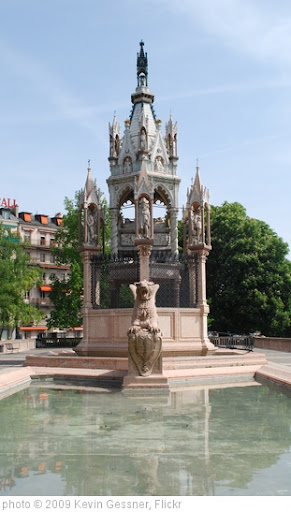“Poetry is an angel with a gun in its hand.”~Jose Garcia Villa
This narrative poem by Browning is well worth your time and energy if you missed it during your school years. I don’t much like short stories, but narrative poems . . . I guess I prefer my stories, if they’re to be short, to be long poems.
My Last Duchess is a dramatic monologue delivered by an Italian duke who is commenting to a visitor on a painting of his deceased duchess. The duke’s attitude of “she smiled too easily, so she’s better off dead” is chillingly heartless.

That’s my last Duchess’ painted on the wall,
Looking as if she were alive. I call
That piece a wonder, now: Fra Pandolf’s hands
Worked busily a day, and there she stands.
Will’t please you sit and look at her? I said
“Fra Pandolf†by design, for never read
Strangers like you that pictured countenance,
The depth and passion of its earnest glance,
But to myself they turned (since none puts by
The curtain I have drawn for you, but I)
And seemed as they would ask me, if they durst,
How such a glance came there; so, not the first
Are you to turn and ask thus. Sir, ’twas not
Her husband’s presence only, called that spot
Of joy into the Duchess’ cheek: perhaps
Fra Pandolf chanced to say “Her mantle laps
Over my lady’s wrist too much,†or “Paint
Must never hope to reproduce the faint
Half-flush that dies along her throatâ€: such stuff
Was courtesy, she thought, and cause enough
For calling up that spot of joy. She had
A heart—how shall I say?—too soon made glad,
Too easily impressed; she liked whate’er
 She looked on, and her looks went everywhere.
She looked on, and her looks went everywhere.
Sir, ’twas all one! My favour at her breast,
The dropping of the daylight in the West,
The bough of cherries some officious fool
Broke in the orchard for her, the white mule
She rode with round the terrace—all and each
Would draw from her alike the approving speech,
Or blush, at least. She thanked men,—good! but thanked
Somehow—I know not how—as if she ranked
My gift of a nine-hundred-years-old name
With anybody’s gift. Who’d stoop to blame
This sort of trifling? Even had you skill
In speech—(which I have not)—to make your will
Quite clear to such an one, and say, “Just this
Or that in you disgusts me; here you miss,
Or there exceed the markâ€â€”and if she let
Herself be lessoned so, nor plainly set
Her wits to yours, forsooth, and made excuse,
—E’en then would be some stooping; and I choose
Never to stoop. Oh sir, she smiled, no doubt,
Whene’er I passed her; but who passed without
Much the same smile? This grew; I gave commands;
Then all smiles stopped together. There she stands
As if alive. Will’t please you rise? We’ll meet
The company below, then. I repeat,
The Count your master’s known munificence
Is ample warrant that no just pretence
Of mine for dowry will be disallowed;
Though his fair daughter’s self, as I avowed
At starting, is my object. Nay, we’ll go
Together down, sir. Notice Neptune, though,
Taming a sea-horse, thought a rarity,
Which Claus of Innsbruck cast in bronze for me
The poem may be specifically about Duke Alfonso II d’Este, the fifth Duke of Ferrara (1533–1598) who, at the age of 25, married Lucrezia di Cosimo de’ Medici, 14-year-old daughter of Cosimo I de’ Medici. Alfonso d’Este and Lucrezia Borgia are minor characters in one of my favorite historical novels, Prince of Foxes by Samuel Shellabarger. If you want more insight into the times and mores of sixteenth century Italy, Prince of Foxes is an excellent read. The novel tells the story of Andrea Orsini, a social climber who is determined to become a gentleman, to do whatever it takes to overcome his humble origins, including service to Cesare Borgia, the Machiavellian politician who plans to unite Italy, by force if necessary. Orsini’s fate becomes entangled with that of his servant and erstwhile assassin, Mario Belli, and also with the fortunes of a beautiful young woman, Camilla Varano, and her elderly husband, the Duke Varano of Citta del Monte. Throughout the novel, Orsini is torn between the demands of his ambition and his sense of morality and honor.
The painting of the woman is Leonardo da Vinci’s Ginevra de’Benci.
Yes, I love this one. Creepy.